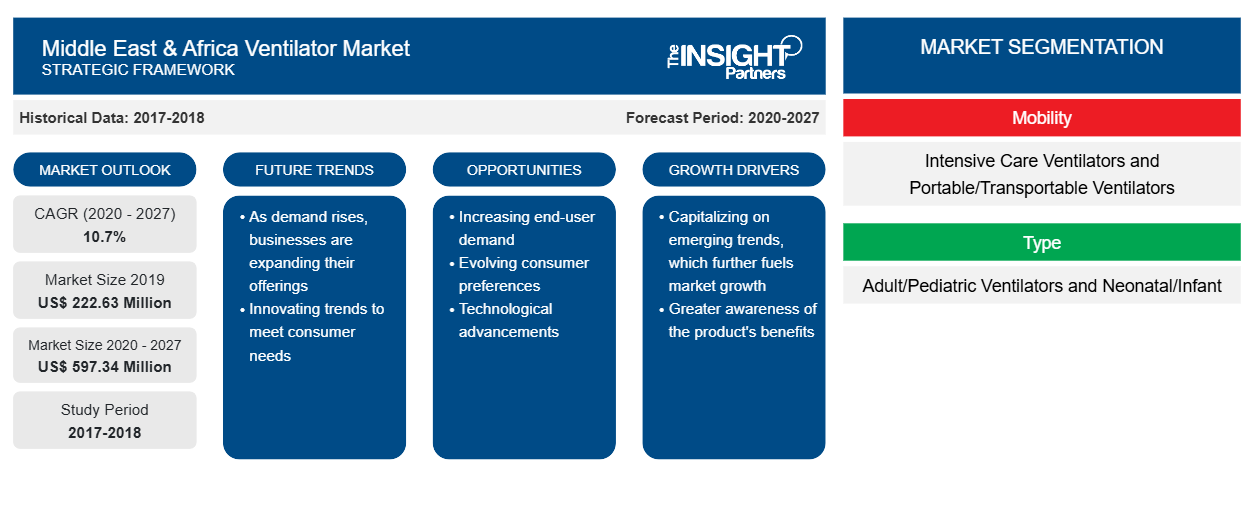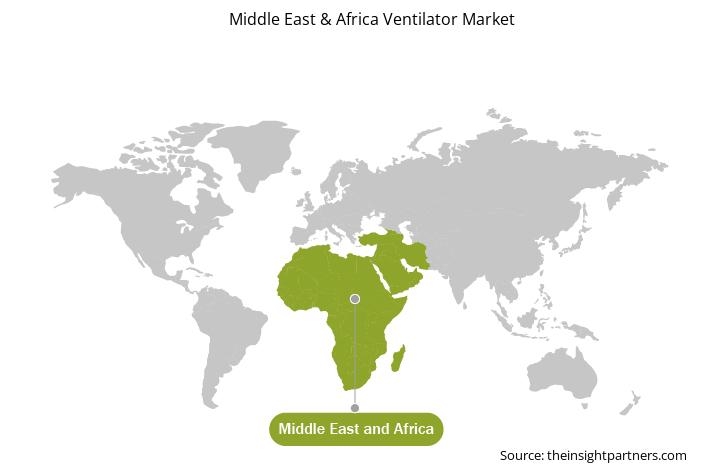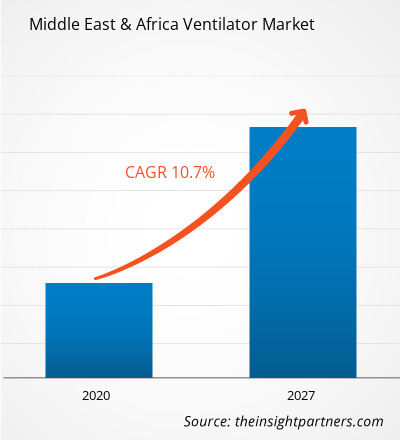The Middle East & Africa ventilator market is expected to reach US$ 597.34million in 2027 from US$ 222.63million in 2019. The market is estimated to grow with a CAGR of 10.7% from 2020-2027.
Ventilators are lifesaving machine mostly used among patients with breathing problem. Ventilators provide mechanical ventilation by moving breathable air in and out of the lungs. They are used to deliver breaths to patients that are physically unable to breathe in their own. These help the body to concentrate on fighting infection or recovering; and breathe for a patient who is unconscious because of a severe infection, buildup of toxins, or drug overdose. The scope of the ventilator market includes mobility, type, mode, interface, end user, and region.
Saudi Arabia Ventilator Market Revenue and Forecasts to 2027 (US$ MN)

- This FREE sample will include data analysis, ranging from market trends to estimates and forecasts.
Market Insights-
Pandemic Detrimental Impact of Covid-19 Pandemic
There has been a rise in various respiratory disorders due to the growing pollution, tobacco consumption, unhealthy lifestyle, and eating habits. Commonly occurring respiratory conditions include chronic obstructive pulmonary disease (COPD), asthma, acute lower respiratory tract infections, tuberculosis, and lung cancer are among the most common causes of severe illness and death globally. These diseases can cause acute respiratory failure, treatment of which requires mechanical ventilation. Growing prevalence of respiratory diseases and coronavirus diseases in South Africa Will generate the demand for ventilator. South Africa, which now has the world’s sixth highest infection burden of around 618,286 confirmed cases, launched a 250 million rand ($14.80 million) project in April to make them here. The first of thousands of South African-designed ventilators rolled off a Cape Town assembly line in July 2020, the country is responding to requests from hospitals needing them for severe COVID-19 cases but unable to get them on global markets. Rising COVID-19 cases, and the seriously ill patient is owing the demand of ventilators worldwide. To fulfill the requirement of ventilator, in light of the Covid-19 pandemic, UAE researchers have built a ventilator prototype in just eight weeks. The project team created the M061 ventilator system, a modular and scalable prototype, relying on interchangeable components that are easy to source and integrate, in an effort to circumvent the worldwide scarcity of crucial medical supplies. Additionally, according to report of Dubai in June 2020, Dubai Future Foundation (DFF) has launched an innovative l ventilator prototype to support frontline healthcare workers supporting patients affected by COVID-19. Moreover, the team has assembled an interdisciplinary team of experts to develop ventilator that would also contribute to the international open source network that has emerged to tackle the shortage in devices. Thus, the covid-19 pandemic has created wide range of opportunities for the ventilator market.
Mobility- Based Market Insights
Based on mobility, the ventilator market, by enzyme, is segmented into intensive care ventilator, and portable/transportable ventilator. The intensive care ventilator segment held the largest share of the market in 2019, whereas the portable/transportable ventilator segment is anticipated to register the highest CAGR in the market during the forecast period.
Middle East & Africa Ventilator Market, by Mobility – 2019 and 2027
Type- Based Market Insights
Based on type, the ventilator market, is segmented into adult/pediatric ventilator, and neonatal/infant. The adult/pediatric ventilator segment held the largest share of the market in 2019, whereas the same segment is anticipated to register the highest CAGR in the market during the forecast period.
Interface- Based Market Insights
Based on interface, the ventilator market, is segmented into invasive ventilator, and non-invasive ventilator. The invasive ventilator segment held the largest share of the market in 2019, whereas the non-invasive ventilator segment is anticipated to register the highest CAGR in the market during the forecast period.
Mode- Based Market Insights
Based on mode, the ventilator market, is segmented into combined mode ventilation, volume mode, ventilation, pressure mode ventilation, neurally adjusted ventilatory assist (NAVA), inverse ratio ventilation (IRV), prone ventilation, high-frequency oscillatory ventilation (HFOV), high-frequency percussive ventilation (HFPV), others. The combined mode ventilator segment held the largest share of the market in 2019, also the segment is anticipated to register the highest CAGR in the market during the forecast period.
End-user- Based Market Insights
Based on end-user, the ventilator market is segmented into hospitals and clinics, homecare, ambulatory care centers, and emergency medical services. The hospitals and clinics segment held the largest share of the market in 2019. Moreover, the same segment is estimated to register the highest CAGR in the market during the forecast period.
Customize This Report To Suit Your Requirement
You will get customization on any report - free of charge - including parts of this report, or country-level analysis, Excel Data pack, as well as avail great offers and discounts for start-ups & universities
Middle East & Africa Ventilator Market: Strategic Insights

- Get Top Key Market Trends of this report.This FREE sample will include data analysis, ranging from market trends to estimates and forecasts.
You will get customization on any report - free of charge - including parts of this report, or country-level analysis, Excel Data pack, as well as avail great offers and discounts for start-ups & universities
Middle East & Africa Ventilator Market: Strategic Insights

- Get Top Key Market Trends of this report.This FREE sample will include data analysis, ranging from market trends to estimates and forecasts.
Investments of International Market Players in Latest Technologies in this Sector
Product launches and approvals are commonly adopted strategies by companies to expand their footprint worldwide and meet the growing demand. The players operating in the ventilator market adopt the expansion, collaboration, and product launch strategies to enlarge customer base across the world. These strategies allow the players to maintain their brand name globally. For instance, Fisher & Paykel Healthcare Corporation Limited announced at the company's annual shareholders' meeting that it has initiated planning for the establishment of its third manufacturing facility in Mexico. The development is expected to be commissioned by the next couple of years. This development will help the company improve its manufacturing capacity to ensure an additional increase in respiratory products.
MIDDLE EAST & AFRICA VENTILATOR MARKET SEGMENTATION
By Mobility
- Intensive Care Ventilators
- Portable/Transportable Ventilators
By Type
- Adult/Paediatric Ventilators
- Neonatal/Infant
By Mode
- Combined Mode Ventilation
- Volume Mode Ventilation
- Pressure Mode Ventilation
- Neurally Adjusted Ventilatory Assist (NAVA)
- Inverse Ratio Ventilation (IRV)
- Prone Ventilation
- High-Frequency Oscillatory Ventilation (HFOV)
- High-Frequency Percussive Ventilation (HFPV)
- Others
By Interface
- Invasive
- Non-Invasive
By End User
- Hospitals and Clinics
- Home Care
- Ambulatory Care Centers
- Emergency Medical Services (EMS)
By Country
Middle East & Africa
- Saudi Arabia
- South Africa
- UAE
Company Profiles
- Vyaire Medical, Inc
- General Electric Company
- Getinge AB
- Dragerwerk AG & Co. KGaA
- Fisher & Paykel Healthcare Limited
- Hamilton Medical
- Koninklijke Philips N.V
- Medtronic
- ResMed
- Smith’s Group plc.
Middle East & Africa Ventilator Market Regional Insights
The regional trends and factors influencing the Middle East & Africa Ventilator Market throughout the forecast period have been thoroughly explained by the analysts at Insight Partners. This section also discusses Middle East & Africa Ventilator Market segments and geography across North America, Europe, Asia Pacific, Middle East and Africa, and South and Central America.

- Get the Regional Specific Data for Middle East & Africa Ventilator Market
Middle East & Africa Ventilator Market Report Scope
| Report Attribute | Details |
|---|---|
| Market size in 2019 | US$ 222.63 Million |
| Market Size by 2027 | US$ 597.34 Million |
| Global CAGR (2020 - 2027) | 10.7% |
| Historical Data | 2017-2018 |
| Forecast period | 2020-2027 |
| Segments Covered |
By Mobility
|
| Regions and Countries Covered | Middle East and Africa
|
| Market leaders and key company profiles |
Middle East & Africa Ventilator Market Players Density: Understanding Its Impact on Business Dynamics
The Middle East & Africa Ventilator Market is growing rapidly, driven by increasing end-user demand due to factors such as evolving consumer preferences, technological advancements, and greater awareness of the product's benefits. As demand rises, businesses are expanding their offerings, innovating to meet consumer needs, and capitalizing on emerging trends, which further fuels market growth.
Market players density refers to the distribution of firms or companies operating within a particular market or industry. It indicates how many competitors (market players) are present in a given market space relative to its size or total market value.
Major Companies operating in the Middle East & Africa Ventilator Market are:
- Vyaire Medical, Inc
- General Electric Company
- Getinge AB
- Dragerwerk AG & Co. KGaA
- Fisher & Paykel Healthcare Limited
Disclaimer: The companies listed above are not ranked in any particular order.

- Get the Middle East & Africa Ventilator Market top key players overview
- Historical Analysis (2 Years), Base Year, Forecast (7 Years) with CAGR
- PEST and SWOT Analysis
- Market Size Value / Volume - Global, Regional, Country
- Industry and Competitive Landscape
- Excel Dataset
Testimonials
I wish to appreciate your support and the professionalism you displayed in the course of attending to my request for information regarding to infectious disease IVD market in Nigeria. I appreciate your patience, your guidance, and the fact that you were willing to offer a discount, which eventually made it possible for us to close a deal. I look forward to engaging The Insight Partners in the future, all thanks to the impression you have created in me as a result of this first encounter.
DR CHIJIOKE ONYIA, MANAGING DIRECTOR, PineCrest Healthcare Ltd.The Insight Partners delivered insightful, well-structured market research with strong domain expertise. Their team was professional and responsive throughout. The user-friendly website made accessing industry reports seamless. We highly recommend them for reliable, high-quality research services
Yukihiko Adachi CEO, Deep Blue, LLC.Reason to Buy
- Informed Decision-Making
- Understanding Market Dynamics
- Competitive Analysis
- Customer Insights
- Market Forecasts
- Risk Mitigation
- Strategic Planning
- Investment Justification
- Identifying Emerging Markets
- Enhancing Marketing Strategies
- Boosting Operational Efficiency
- Tracking Industry Innovations
- Aligning with Regulatory Trends
Yes! We provide a free sample of the report, which includes Report Scope (Table of Contents), report structure, and selected insights to help you assess the value of the full report. Please click on the "Download Sample" button or contact us to receive your copy.
Absolutely — analyst assistance is part of the package. You can connect with our analyst post-purchase to clarify report insights, methodology or discuss how the findings apply to your business needs.
Once your order is successfully placed, you will receive a confirmation email along with your invoice.
• For published reports: You’ll receive access to the report within 4–6 working hours via a secured email sent to your email.
• For upcoming reports: Your order will be recorded as a pre-booking. Our team will share the estimated release date and keep you informed of any updates. As soon as the report is published, it will be delivered to your registered email.
We offer customization options to align the report with your specific objectives. Whether you need deeper insights into a particular region, industry segment, competitor analysis, or data cut, our research team can tailor the report accordingly. Please share your requirements with us, and we’ll be happy to provide a customized proposal or scope.
The report is available in either PDF format or as an Excel dataset, depending on the license you choose.
The PDF version provides the full analysis and visuals in a ready-to-read format. The Excel dataset includes all underlying data tables for easy manipulation and further analysis.
Please review the license options at checkout or contact us to confirm which formats are included with your purchase.
Our payment process is fully secure and PCI-DSS compliant.
We use trusted and encrypted payment gateways to ensure that all transactions are protected with industry-standard SSL encryption. Your payment details are never stored on our servers and are handled securely by certified third-party processors.
You can make your purchase with confidence, knowing your personal and financial information is safe with us.
Yes, we do offer special pricing for bulk purchases.
If you're interested in purchasing multiple reports, we’re happy to provide a customized bundle offer or volume-based discount tailored to your needs. Please contact our sales team with the list of reports you’re considering, and we’ll share a personalized quote.
Yes, absolutely.
Our team is available to help you make an informed decision. Whether you have questions about the report’s scope, methodology, customization options, or which license suits you best, we’re here to assist. Please reach out to us at sales@theinsightpartners.com, and one of our representatives will get in touch promptly.
Yes, a billing invoice will be automatically generated and sent to your registered email upon successful completion of your purchase.
If you need the invoice in a specific format or require additional details (such as company name, GST, or VAT information), feel free to contact us, and we’ll be happy to assist.
Yes, certainly.
If you encounter any difficulties accessing or receiving your report, our support team is ready to assist you. Simply reach out to us via email or live chat with your order information, and we’ll ensure the issue is resolved quickly so you can access your report without interruption.















- Vyaire Medical, Inc
- General Electric Company
- Getinge AB
- Dragerwerk AG & Co. KGaA
- Fisher & Paykel Healthcare Limited
- Hamilton Medical
- Koninklijke Philips N.V
- Medtronic
- ResMed
- Smith’s Group plc.






 Get Free Sample For
Get Free Sample For